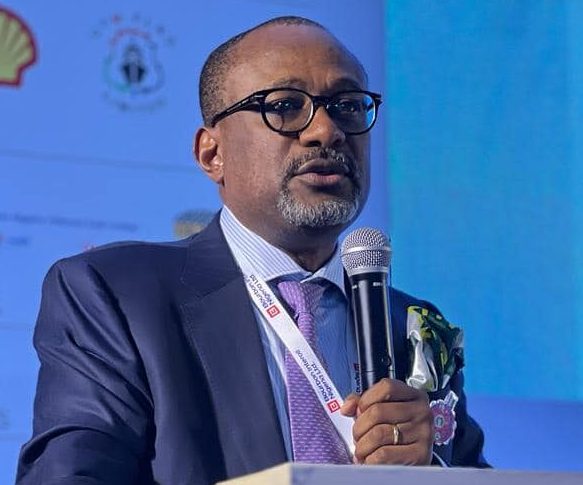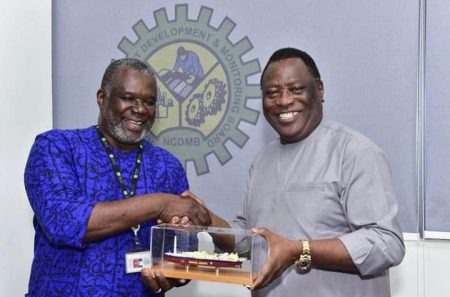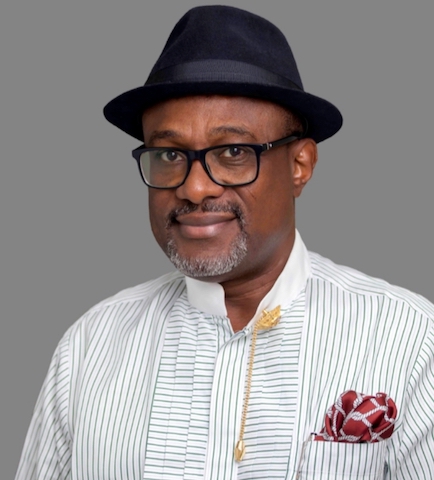
– Seeks double-digit oil contribution to GDP
– Unveils five key investment areas for investors
– Over 70 companies have benefited from NCDMB intervention fund
Oritsegbubemi Omatseyin
Lagos — The Executive Secretary of the Nigerian Content Development and Monitoring Board, NCDMB, Simbi Wabote has called for more action in the oil and gas sector noting that the Nigerian oil and gas industry can serve as a Catalyst for the industrialization of the country if we are bold and disruptive in our strategy.
While delivering his welcome address at the 4th edition of the Nigerian Oil and Gas Opportunity Fair (NOGOF 2023) held on Thursday in Bayelsa, Wabote said the theme of NOGOF 2023 “Oil and Gas Industry: Catalyst and Fuel for the Industrialization of Nigeria” was aimed at reflecting the pivotal role that the oil and gas industry is expected to play in driving the economic growth and development of Nigeria.
He said “Of late, the role expected of the oil and gas industry has been dwindling due to missed opportunities as a result of policy inconsistencies, deferred decisions, and investments apathy. Just to set the context, I would like to draw your attention to the nation’s GDP growth rate between the years 2021 to 2022 as released by the National Bureau for Statistics (NBS). Over this period, the growth of the nation’s GDP has been marginal, but the reality is that we need to drive the growth rate to double digits for us to achieve the level of economic advancement and development that we desire.”
Wabote noted that the NBS report revealed that the total annual contribution of oil to aggregate GDP in 2022 was 5.67 percent compared to 7.24 percent in 2021 and the oil sector has steadily dropped behind Agriculture, Trade, Telecommunications/ICT, and Real Estate in terms of sectors that contributed the most to Nigeria’s GDP.
He said these are signs of a dying sector, and we must all join hands to stop the decline so that we can return oil and gas contribution to GDP to double digits levels similar to other major oil-producing countries.
He made reference to Norway which has doubled its GDP in the last 2 years from $ 171.2 billion to $ 367 billion with the oil and gas sector contributing about 20 percent followed by their hydropower.
“Although Norway is in a different clime from Nigeria, we share some similarities when we look at the huge deposits of natural resources coupled with a skilled labor force and the adoption of new technology that made Norway a prosperous country during the twentieth and twenty-first centuries. I believe that the oil and gas sector can serve as the catalyst that will enable us to achieve the desired double-digit GDP growth rate if we are bold and disruptive in our strategy.”
Wabote explained that one probable means through which double-digit GDP growth can be achieved is by harnessing the array of opportunities that exists in various categories enabled by the oil and gas industry.
In the aspect of creating opportunities, Wabote noted that the NOGICD Act sets the minimum targets in 278 services across the oil and gas value chain in the Schedule.
He said He had always referred to the Schedule of the NOGICD Act as a compendium of opportunities waiting for any serious investor to tap into as the schedule lists out the various activities in the oil and gas industry and sets out the desired level of Nigerian content for which any discerning investor can position himself or herself for patronage.
“We have therefore designed NOGOF with the following objectives in mind: Showcase opportunities in the Upstream, Midstream, and Downstream sectors of the Petroleum Industry, Provide the opportunity for foreign and local investors to build synergies in the Nigerian oil and gas industry, Provide Nigerian companies and prospective investors an opportunity to showcase their capabilities, Provide stakeholders with information on upcoming projects to enable Nigerian companies/manufacturers tailor their business development strategies and Identify high impact activities with potential for in-country value addition with a 5-year outlook to deepen the practice of Nigerian Content.”
He also mentioned five categories of opportunities that would be harnessed at NOGOF 2023 which are Policy Driven Opportunities, People Driven Opportunities, Fund Driven Opportunities, Infrastructure Driven Opportunities, and Situational Opportunities and opportunities driven by policies, guidelines, regulations, and statutes are attractive to investors as there is clarity on the framework governing their business endeavors.
He said Several policies have been formulated and implemented by the Government in their quest to stimulate economic growth and development and the key thing to note is that every policy, regulation, or statute holds an array of opportunities that can be harnessed and utilized to achieve significant benefits.
Speaking on the achievements of NCDMB, Wabote said that Through Its Capacity Building Directorate, NCDMB has funded and engaged in numerous training activities across the country.
“The NCDMB has been a champion for providing opportunities for youths and women in the oil and gas industry and its linkage sectors through valued training. This training provides youths — both male and female — with the requisite skill set necessary for them to participate in opportunities across different industries, especially in this technology-driven age.
“We have provided train-the-trainers programs across the country, delivered over 13 million man-hours in On-the-Job training covering sea-time for marine cadets, non-destructive testing, equipping youths in new skill sets such as GSM repair, solar power installation, and provision of entrepreneurial exposure that will ensure sustainability. With almost one million graduates, technicians, and artisans being produced every year, there is a huge need to provide Human Capacity Development programs to develop our youths and keep them engaged in productive activities.
“We have introduced and widened the options for accessing interventions even further with our $300 million Nigerian Content Intervention Fund with BOI, our $50 million Nigerian Content R&D Fund, and our $50 million NOGaPS Manufacturing Fund.
“Over 70 companies have so far benefited from the intervention funds for asset acquisition, manufacturing, loan refinancing, and project financing. The forensic audit of remittances to the Nigerian Content Development Fund also opened up opportunities for 25 audit companies engaged to check the books of about 150 companies.
“I am delighted that some of the capacities and capabilities developed in the oil and gas industry have been deployed to deliver these infrastructures.
He called on other service companies not to limit their focus only to opportunities within the oil and gas industry but extend it to other sectors of the economy.
“On our part, we continue to put in place some building blocks to support value retention in-country. The Nigerian Oil and Gas Park Scheme (NOGaPS) at Odukpani in Cross River state and the one at Emeyal-1 in Bayelsa state are both at advanced stages of completion.
“The industrial parks provide opportunities in the areas of manufacturing, logistics, security, facilities management, training, catering services, occupational health services, and many others.
“With the completion and commissioning of the Nigerian Content Tower about three years ago, we have commenced the construction of the 200-room Conference Hotel next door to complement the NCDMB Conference Center wherein we are seated.
“The Oloibiri Museum and Research Centre is another complementary infrastructure that will enhance Conference Tourism in this part of the country.
“We have also commenced the front-end design of the Brass Island Shipyard Project. We see opportunities on the need to put in place a dockyard of sufficient size to handle repair and maintenance requirements of marine vessels of various sizes including container ships, oil tankers, and LNG carriers.”
“The Brass Island Shipyard project entails the development of a 310m graving dock, 650m fitting out quay for LNG carriers, oil tankers, and cargo ships of up to 150,000DWT (Deadweight Tonnage). In a year, the shipyard will enable in-country maintenance and repairs of seven LNG vessels or oil tankers, 21 container ships, 8 jack-ups, and 30 other vessels. The shipyard will further boost our national shipbuilding, maintenance, and servicing capacity thereby earning the much-needed revenue and foreign exchange for Nigeria.”
“As the Lekki Deep Seaport becomes operational in addition to existing ports, Nigeria will witness more vessels coming into the nation and a facility like the Brass Island Shipyard will create a situation where the LNG tankers and other vessels can carry out maintenance and repairs here in Nigeria.”
“The Presidential Power Initiative with Siemens provides a roadmap to get us to 25,000MW stable electricity. In the gas sector, we anticipate a lot of activities in LPG, CNG, and LNG utilization in-country underpinned by the Decade of Gas program. We also believe there will be a considerable energy mix with the renewables – especially solar energy.”
He expressed delight towards the upcoming commissioning of the Dangote Refinery and Implored all stakeholders in the oil and gas industry to count on NCDMB to support the realization of their target opportunities. He said that as an incurable optimist, He looks forward to the oil and gas industry truly fuelling the industrialization of the nation by the time the next NOGOF event is held.
Follow us on twitter



